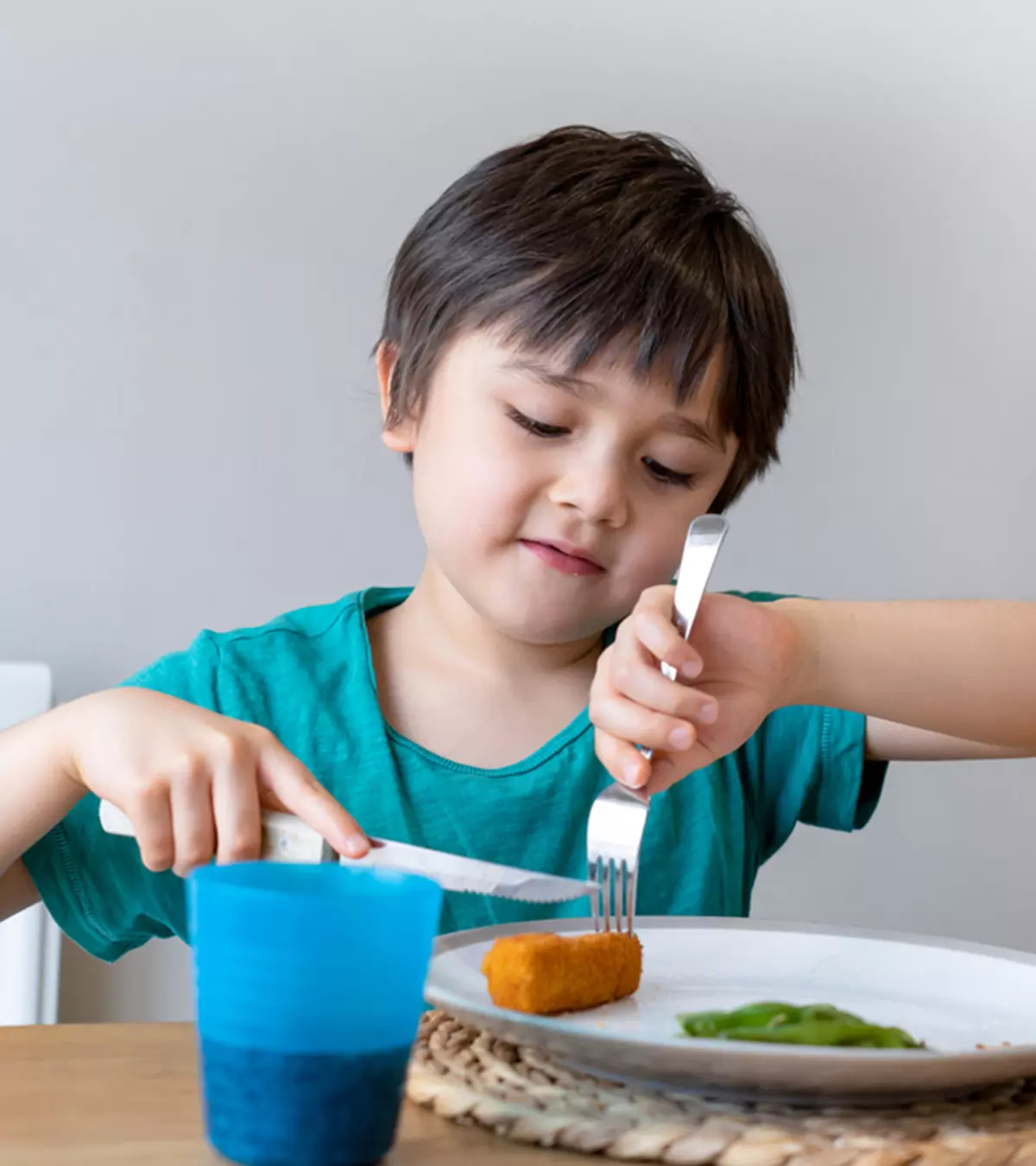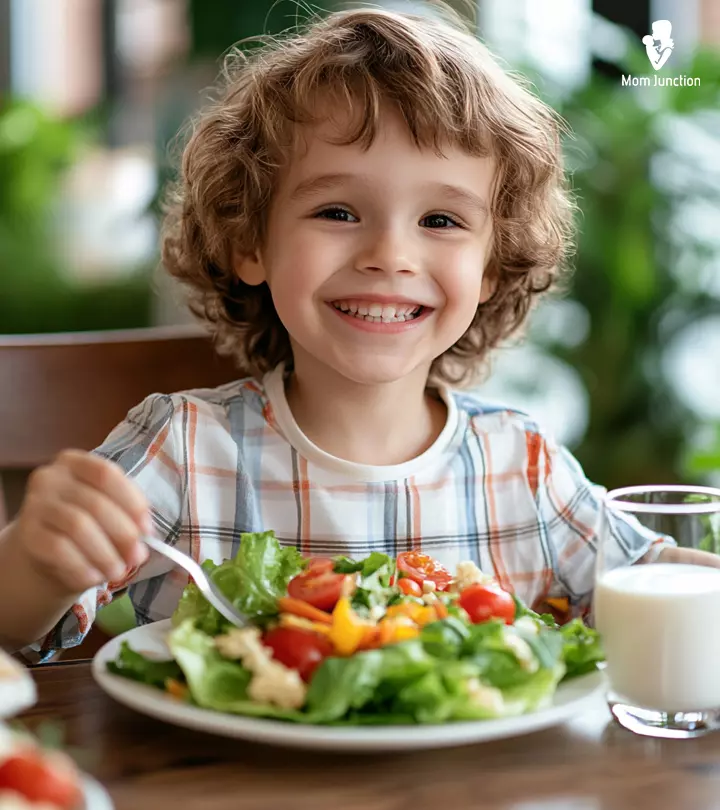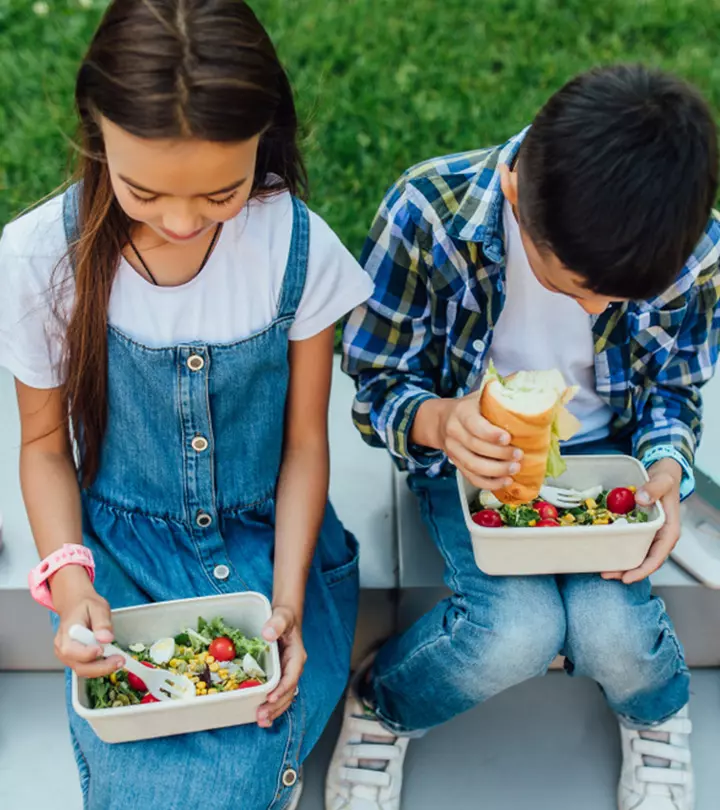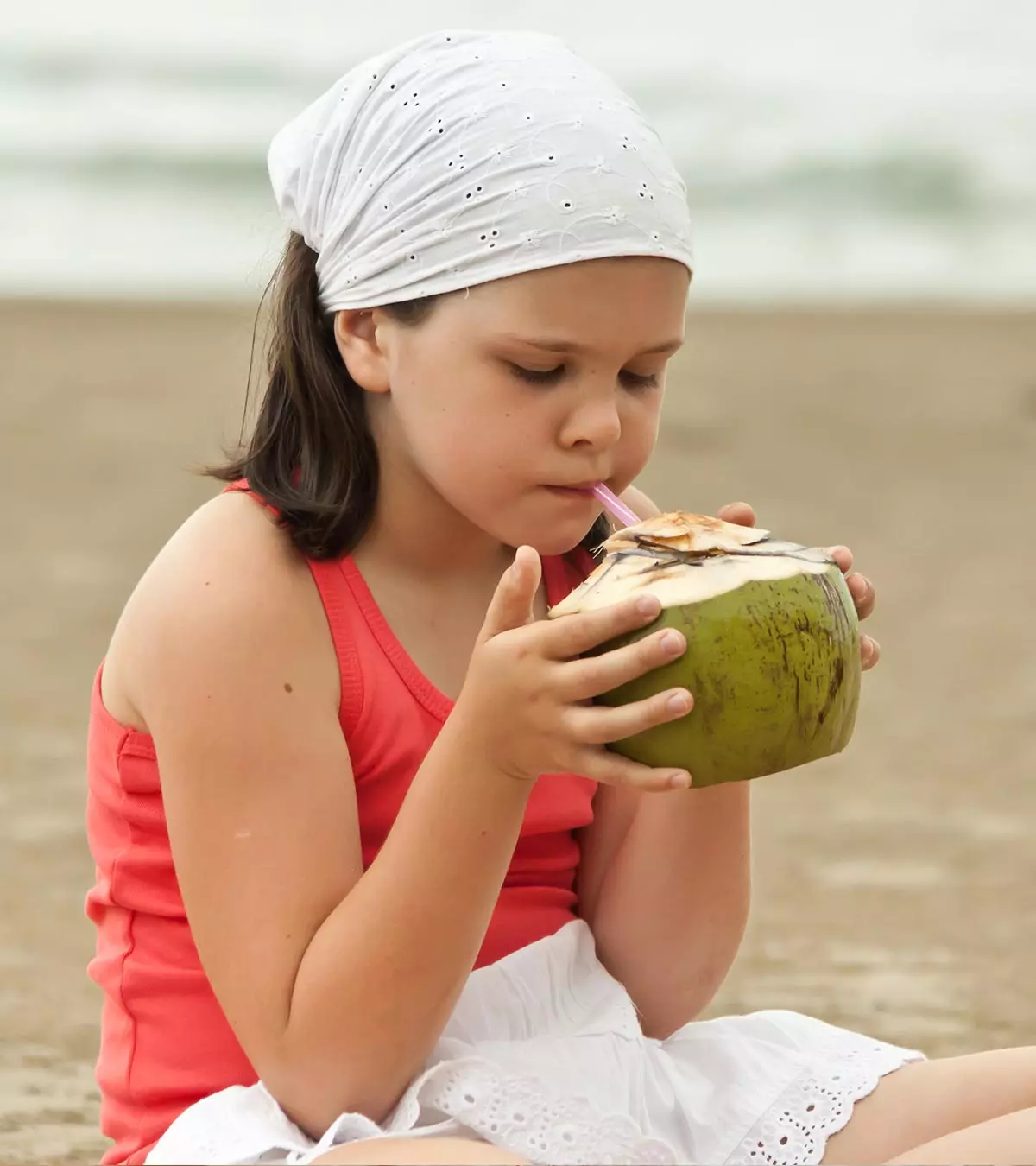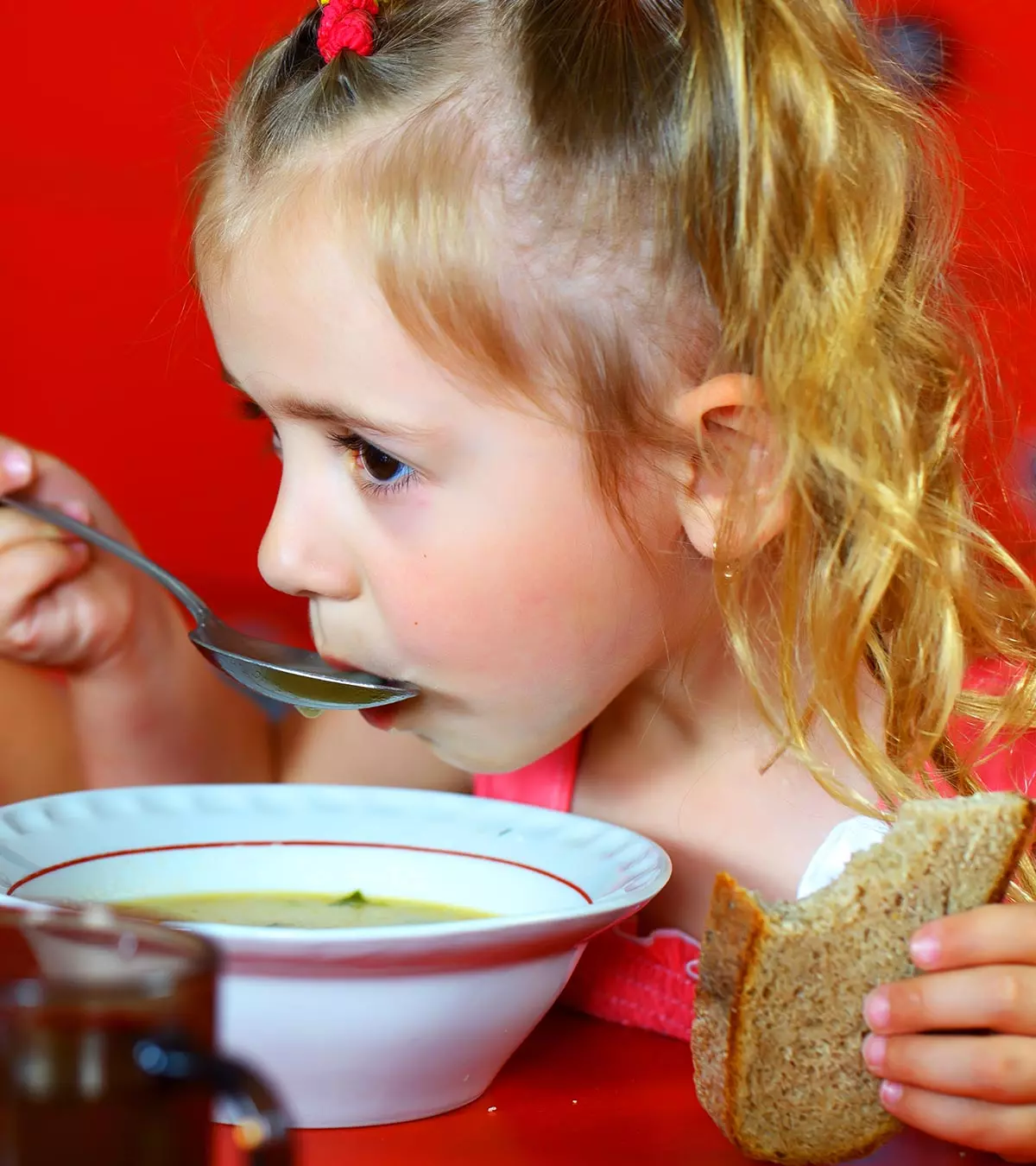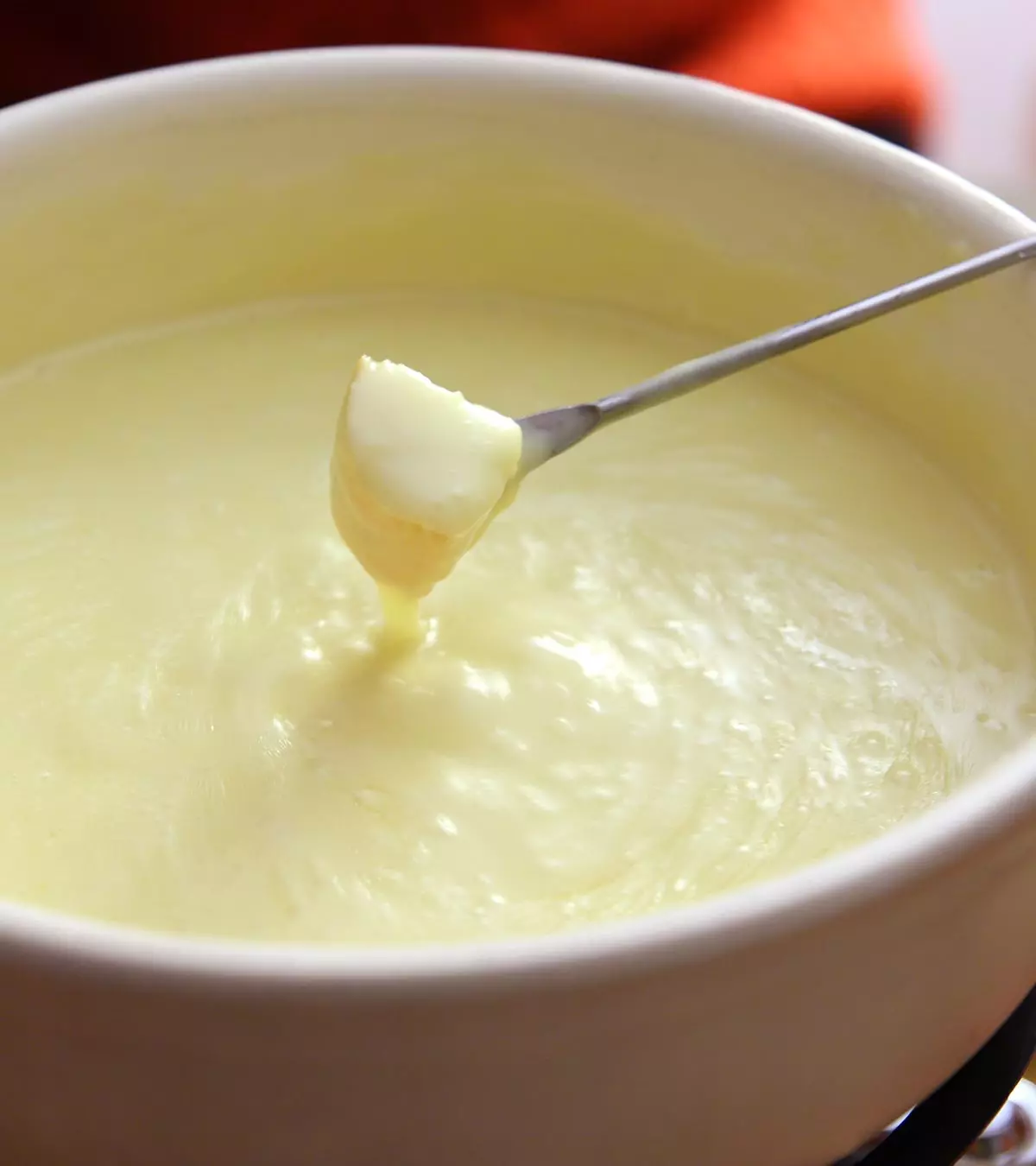
Image: ShutterStock
Attention deficit hyperactivity (ADHD) is a common neurodevelopmental disorderiIllnesses that affect the functioning of the brain, impairing social, cognitive, and emotional abilities. in children. A few studies state that certain foods and nutrients may impact a child’s mood and self-control (1). A diet for kids with ADHD could consist of these food items and nutrients.
In general, children with ADHD should consume a healthy, well-balanced diet that supports their behavior and aids their proper growth and development. Although adding these foods has not proven to cure ADHD, it could be beneficial.
We have included a few tips on planning such nutritious diets for children with ADHD in this post. We have also included a list of foods to include and avoid.
Key Pointers
- Food cannot cure or cause ADHD.
- Studies show that a diet with high sugar and fat increases its risk, while a diet rich in fruits, vegetables, and whole grains lowers it.
- An ADHD diet should contain complex carbohydrates, lean protein, healthy fats, and vitamins and minerals.
- Avoid foods with artificial colors, refined sugar, caffeine, and allergens.
- If needed, consult a nutrition expert for customized diet plans.
Foods To Include In The ADHD Diet
While there isn’t a specific food that can cure or alleviate ADHD symptoms, ADHD is associated with certain diets. According to some studies, a western-style diet high in fat and refined sugar is linked with an increased risk of ADHD, while a Mediterranean diet rich in fruits, vegetables, whole grains, legumes, seafood, and olive oil has an inverse relation with ADHD (2) (3). Hence, parents should focus on making the child’s daily diet nutritious.
A well-balanced ADHD diet should contain various healthy foods from different food groups and provide the following nutrients (4).
1. Complex carbohydrates
Complex carbs are sugars that the body digests slowly, causing a steady release of glucose (a simple sugar) into the bloodstream (5). A steady release of glucose is essential for hunger and appetite regulation and energy metabolism. Whole grains and cereals, legumes, fruits, and starchy vegetables are good sources of complex carbohydrates. So, add these foods to your child’s diet in moderation and as a part of a healthy and wholesome diet.
 Did you know?
Did you know?2. Lean protein
Protein is the building block of life and helps regulate many functions in the body, from cell regeneration to enzyme production (6). Add healthy sources of protein, such as beans, legumes, tofu, low-fat dairy, egg whites, chicken, fish, and nuts, to your child’s daily diet for muscle growth. Children between four and 14 years require 19 to 46 grams of protein per day (7).
3. Healthy fats
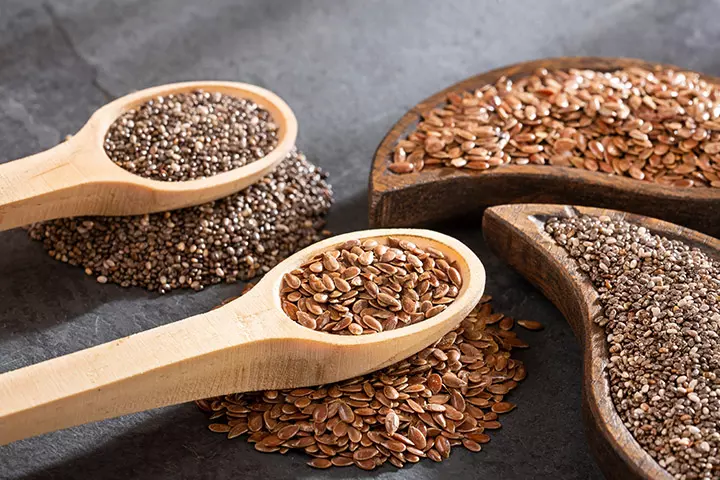
Children between four to 14 years of age should receive 25 to 35 percent of their total daily energy from fats (7). Of these, less than ten percent should come from saturated fats and the remaining from unsaturated fats. Fats are essential for humans for several reasons, including aiding the absorption of fat-soluble vitamins A, D, E, and K.
So, feed unsaturated fats, such as MUFAiFatty acids with use in the prevention of conditions such as heart disorders and high blood pressure. and PUFAiEssential fatty acids required for the proper functioning of the cells, and brain and prevention of diseases. , in the right proportions to a child. And ensure you include omega-3 fatty acids (PUFA), which may reduce symptoms of ADHD (8). Some of the good sources of omega-3 fatty acids include
- Fatty fish (tuna and salmon)
- Nuts, such as walnuts
- Seeds, such as chia and flax seeds
4. Vitamins and minerals
Low zinc and iron levels are often associated with ADHD (3). However, there’s no concrete evidence that deficiency of any vitamin or minerals causes ADHD. Nevertheless, some studies indicate that micronutrient supplementation may improve certain symptoms of ADHD, such as inattention (9) (10). Additionally, in general, consuming micronutrients is necessary for overall health and well-being.
Thus, ensure you give your child all the vital micronutrients in the right amounts. Some micronutrients that are crucial during childhood and the teenage years include vitamin D, vitamin B6, calcium, zinc, iron, and magnesium. Fruits, dried fruits, vegetables, whole grains, low-fat dairy, seafood, seeds, and nuts can offer you these and several more micronutrients in abundance. So, ensure you feed your child a variety of foods.
Now that you know the foods you should add to your child’s diet, know the foods that you should avoid or limit.
 Research finds
Research findsFoods To Limit Or Avoid
ADHD cannot be cured by eliminating foods from the diet. However, some studies and anecdotal evidence demonstrate that removing certain unhealthy foods from the diet (elimination diet) may improve some symptoms of ADHD (11). Eliminating some of the following foods and food ingredients might alleviate a child’s ADHD symptoms.
1. Artificial food colors and dyes
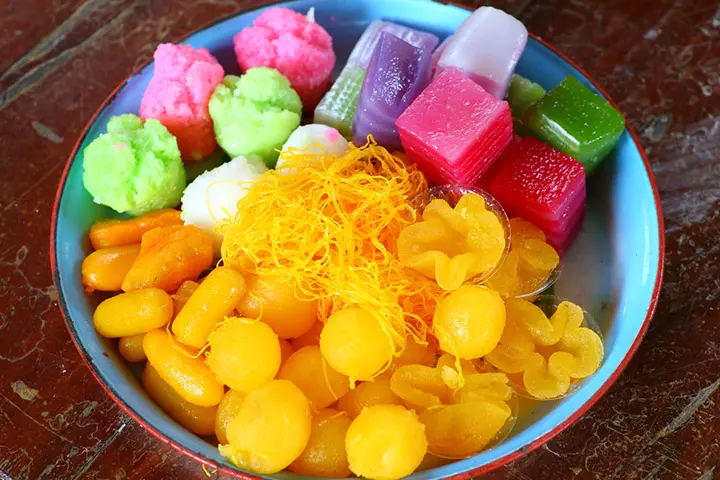
Processed and packaged foods often contain artificial food colorings and dyes. These additives make the food look colorful and attractive, but they may exacerbate ADHD symptoms. The exact mechanism of how these chemical-based colors and dyes affect ADHD is unknown. Yet, keeping the intake of foods containing artificial colors and dyes at a minimum is important for the health of every child.
2. Refined sugar
Some parents believe that high sugar consumption causes hyperactivity in children, especially those with ADHD. However, experts state that an intake of high sugar and ADHD related hyperactivity isn’t correlated (12). Yet, in general, a high-sugar diet isn’t good for anyone, let alone children.
Research shows that high sugar intake in childhood exposes a child to chronic health issues, such as obesity, tooth decay, and type-2 diabetes (13). According to data from the Centers for Disease Control and Prevention, three in five Americans aged two and older do not follow the recommendation of consuming a diet where less than 10% of their total daily calories come from added sugars on any given day. Hence, limiting your child’s sugar intake is a wise decision, even if it does not directly affect behavior.
 Did you know?
Did you know?3. Caffeine
Caffeine is a natural stimulant that can adversely affect the central nervous system and heart when consumed in large amounts. The American Academy of Pediatrics (AAP) advises against the use of caffeine or caffeinated beverages, such as soft drinks, for children under five years of age (14). Although caffeine has shown effectiveness in improving functioning and reducing hyperactivity, it can amplify the effect of ADHD medications, and its excessive intake can have side effects, such as appetite suppression and insomnia, which can worsen ADHD symptoms (15) (16). Thus, all children should avoid caffeine and caffeinated products. As for the use of caffeine for improving ADHD symptoms, it’s a matter one should discuss with a pediatrician.
4. Allergens
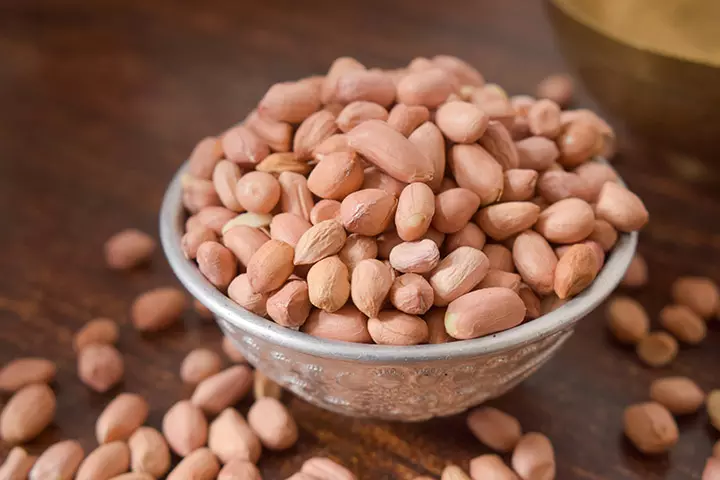
Some children with ADHD may have sensitivity or intolerance to specific foods, such as salicylate-containing foods (tomato and grapes) and common allergens such as milk, soy, seafood, wheat, and peanuts. A cross-sectional study conducted on school children concluded that “early food allergy is associated with ADHD” (17).
Thus, eliminating foods that cause sensitivity may help. However, this needs to be done with close pediatric guidance as the intervention may not be helpful for children with ADHD who aren’t allergic or sensitive to foods.
A mother of a boy diagnosed with ADHD shares how she planned and prepared an ADHD- friendly cake for her son’s birthday party. She writes, “Many kids with ADHD have gluten sensitivity. I’ve whipped up gluten-free cakes earlier, but this time, my son wanted to see what happened when we put some of his favorite gluten-free rice-crispy-style chocolate cereal in the batter. His ideas led to the successful creation of chocolate sludge cake (i).”
Natural Supplements For Children With ADHD
Natural supplements have gained popularity for being effective against ADHD despite the fact that conclusive studies or research done on large study groups proving their efficacy are scarce. It is essential to discuss this with your child’s doctor before trying any of these supplements for your child. Popular natural supplements include (18) (19):
Bacopa monnieri or brahmi: It is known to improve blood flow to the brain and help with memory and attention.
Ginkgo biloba: It has neuroprotective effects. May enhance mental sharpness and may improve memory
Pycnogenol: Made from pine bark extract, this supplement may reduce hyperactivity and improve concentration and attention.
 Point to consider
Point to considerTips To Provide A Healthy ADHD Diet For Children
Managing a child with ADHD can be overwhelming, and many parents struggle to organize and plan their child’s diet. Here are some useful tips that may help you plan their diet and encourage healthy eating in children with ADHD.
- Follow a routine: Children with ADHD struggle with planning, organizing, and scheduling activities. Therefore, following a routine is a good way to make them more organized. You could try serving meals at the same time daily. In addition, ensure the meals are colorful and flavorful so that children look forward to eating.
- Never skip meals: Skipping meals can cause a dip in energy levels and trigger overeating, especially junk foods such as chips and cookies. So, a child must eat well-balanced meals at regular intervals. When you plan and prepare these meals, involve your child so that they may understand and appreciate each food’s versatility and importance.
- Serve your child a well-balanced diet. Well-balanced meals are those that contain an abundance of healthy foods from different food groups. For instance, whole grain cereals, fruits, veggies, nuts, seeds, and low-fat dairy products are a source of macro and micronutrients that children need to grow and develop. So, pay attention to what your child is eating and how you can make it wholesome.
- Avoid ultra-processed foods:Ultra-processed foods are high in fat and sugar. They may also contain additives, such as artificial food colors, and preservatives, which may have an impact on your child’s behavior. So, limit your child’s intake of processed foods and encourage them to have healthy eating habits. Instead, offer them healthy snacks that are filling. Here are some healthy options that you can provide to your child:
- Fresh seasonal fruits, such as banana, apple, papaya, dragon fruit, plum, peach, and nectarines
- Low-fat, unsweetened yogurt with fruits, homemade smoothies, and shakes
- Dried fruit with no added sugar
- Air-popped, saltless popcorn
- Baked vegetables
- Whole-grain chips
- Roasted chickpeas
- Seeds and nuts trail mix
- High-fiber cereals with dried fruits and nuts
- Boiled/steamed/sauteed veggies with homemade dips, such as hummus and baba ghanoush
Whatever healthy snacks you plan to feed your child, ensure you provide them with two to three healthy snack options and let them decide what they want to eat. Then, keep these preferred foods in easy access so that your child can eat them whenever they are hungry.
- Be a role model for your child: Children learn from example. So, display responsible eating behavior to your child and let them follow in your footsteps. While eating at home or dining in a restaurant, pick healthy foods, such as lean meat, fish, veggies, and whole grains. Eat together as much as possible to let them experience healthy home-cooked food – sharing meals will also help you spend quality time together.

- Train your child to read food labels: Many store-bought products contain ingredients that aren’t healthy for children. Hence, reading nutritional labels is vital to make informed food choices. So, let your child accompany you during grocery shopping and show them the right way to read and depict food labels. Teach them to avoid products containing refined grains, sugar, hydrogenated and trans fats, high amounts of sodium, and additives, such as artificial food colors or dyes and preservatives.
- Consult a diet expert. A certified nutritionist (dietician) who works predominantly with ADHD patients can help you develop a customized diet plan for your child. In addition, they can help a child with ADHD recognize, understand, and rectify their dietary issues. Furthermore, they can also guide you regarding dietary or nutritional supplement use for your child, if necessary.
Frequently Asked Questions
1. Do children with ADHD have food issues?
Yes. Evidence suggests that ADHD is associated with eating disorders and other food-related issues, such as binge eating disorder (BED), selective eating, food sensitivities or allergic reactions to specific foods, and sugar cravings (20)(21).
2. Can ADHD be cured with diet changes?
No. Although dietary interventions cannot cure ADHD, they may help reduce it. A study showed that a strict elimination diet might have a 10–30% chance of improving symptoms in children with ADHD (11).
3. How can I help my child with ADHD without medication?
Fostering good sleeping habits, having healthy eating habits, and practicing mindfulness can help improve focus and concentration, and minimize other symptoms of ADHD without medication. You could also enroll them in brain training programs and behavioral therapy sessions, introduce them to music, try specific activities for kids with ADHD, and engage them in outdoor activities to bring forth necessary behavioral changes (22).
4. What is the best natural supplement for ADHD?
Natural supplements of Omega-3 fatty acids, like fish oil, have shown to improve ADHD symptoms such as impulsivity and trouble focusing by improving brain function (23).
5. Does milk make ADHD worse in children?
Casein, the protein in dairy products like milk and cheese, becomes a morphine-like compound called casomorphin once it enters your body. It gets attached to the opiate receptors in the brain and may worsen ADHD symptoms, Excess amounts of these compounds can lead to problems like moodiness, brain fog, sleep disturbances, fatigue, speech and hearing troubles, anxiety, and depression (24).
While adding certain nutritious and well-balanced meals to the diet of ADHD kids has not proven to cure ADHD, it may help improve their mood and promote their proper growth and development. A diet rich in fruits, vegetables, whole grains, legumes, seafood, and other healthy foods for kids that contain all the required nutrients, such as carbs, vitamins, lean protein, minerals, and healthy fats, should be included in an ADHD diet for kids. However, ensure your child eats various healthful meals in moderation and avoids excessive consumption of refined sugar, caffeine, unhealthy fats, or salt. In addition, following a routine and training your child to read food labels could help.
Infographic: Can Herbal Supplements Help Children With ADHD?
Besides diet and dietary supplements, certain herbs may be effective in helping children with ADHD. Although further research is required in this aspect, you may consult a doctor or an expert to identify a safe herbal supplement for your child. Go through the infographic below to learn about the available options. Illustration: Momjunction Design Team
Are you concerned about your child’s diet if they have ADHD? Learn how to ensure they’re eating a healthy diet and how it helps manage ADHD in this video!
Personal Experience: Source
MomJunction articles include first-hand experiences to provide you with better insights through real-life narratives. Here are the sources of personal accounts referenced in this article.
i. ADHD diet-friendly Dinosaur birthday party; https://adhdnaturalmamma.wordpress.com/2014/09/13/adhd-diet-friendly-dinosaur-birthday-party/References
- What Should I Feed My Child with ADHD?
https://chadd.org/wp-content/uploads/2018/06/ATTN_06_12_GLANZMAN.pdf - Liang-Jen Wang et al. (2019). Dietary Profiles Nutritional Biochemistry Status and Attention-Deficit/Hyperactivity Disorder: Path Analysis for a Case-Control Study.
https://www.ncbi.nlm.nih.gov/pmc/articles/PMC6572510/ - Alejandra Ríos-Hernández et al. (2017). The Mediterranean Diet and ADHD in Children and Adolescents.
https://pediatrics.aappublications.org/content/139/2/e20162027 - Attention Deficit Hyperactivity Disorder (ADHD) And Diet.
https://www.tewv.nhs.uk/about-your-care/conditions/adhd/diet/ - Carbohydrates.
https://www.heart.org/en/healthy-living/healthy-eating/eat-smart/nutrition-basics/carbohydrates - What are proteins and what do they do?
https://medlineplus.gov/genetics/understanding/howgeneswork/protein/ - Dietary Guidelines for Americans 2020-2025.
https://www.dietaryguidelines.gov/sites/default/files/2020-12/Dietary_Guidelines_for_Americans_2020-2025.pdf - Alexandra J Richardson. (2006). Omega-3 fatty acids in ADHD and related neurodevelopmental disorders.
https://pubmed.ncbi.nlm.nih.gov/16777670/ - Amelia Villagomez and Ujjwal Ramtekkar. (2014). Iron Magnesium Vitamin D and Zinc Deficiencies in Children Presenting with Symptoms of Attention-Deficit/Hyperactivity Disorder.
https://www.ncbi.nlm.nih.gov/pmc/articles/PMC4928738/ - Julia J Rucklidge et al. (2017). Vitamin-mineral treatment improves aggression and emotional regulation in children with ADHD: a fully blinded randomized placebo-controlled trial.
https://pubmed.ncbi.nlm.nih.gov/28967099/ - Joel T. Nigg and Kathleen Holton. (2014). Restriction and Elimination Diets in ADHD Treatment.
https://www.ncbi.nlm.nih.gov/pmc/articles/PMC4322780/ - Sugar: Does it Really Cause Hyperactivity?
https://www.eatright.org/health/wellness/healthful-habits/sugar-does-it-really-cause-hyperactivity - Leila Shafie Bafti et al.; (2015); Relationship between Body Mass Index and Tooth Decay in a Population of 3–6-Year-Old Children in Iran.
https://www.hindawi.com/journals/ijd/2015/126530/ - Recommended Drinks for Children Age 5 & Younger.
https://www.healthychildren.org/English/healthy-living/nutrition/Pages/Recommended-Drinks-for-Young-Children-Ages-0-5.aspx - A sip into dangerous territory.
https://www.apa.org/monitor/jun01/dangersip - My son has a very mild case of ADHD combined. Would coffee help him?
https://childmind.org/article/my-son-has-a-very-mild-case-of-adhd-combined-would-coffee-help-him/ - Xiaodong Jiang et al.; (2018); Early food allergy and respiratory allergy symptoms and attention-deficit/hyperactivity disorder in Chinese children: A cross-sectional study.
https://pubmed.ncbi.nlm.nih.gov/29524252/ - Managing ADHD Symptoms Without Medication.
https://www.uhhospitals.org/blog/articles/2023/03/managing-adhd-symptoms-without-medication - Tusheema Dutta et al.; (2022); Phytotherapy for Attention Deficit Hyperactivity Disorder (ADHD): A Systematic Review and Meta-analysis.
https://www.frontiersin.org/journals/pharmacology/articles/10.3389/fphar.2022.827411/full - ADHD and eating disorders.
https://www.understood.org/en/articles/adhd-eating-disorders - Richard J. Johnson et al.; (2013); Attention-Deficit/Hyperactivity Disorder: Is it Time to Reappraise the Role of Sugar Consumption?
https://www.ncbi.nlm.nih.gov/pmc/articles/PMC3598008/ - Helping Children with ADHD Focus Without Medication: 7 Tips for Parents.
https://www.rtor.org/2021/05/03/helping-children-with-adhd-focus-without-medication-tips-for-parents/ - ADHD alternative treatment.
https://www.understood.org/en/articles/adhd-alternative-treatment-what-you-need-to-know - Nutrition and Exercise.
https://www.lanc.org.uk/wp-content/uploads/2013/01/Nutrition-and-exercise-full-handout.pdf - Vitamins, minerals improve symptoms for children with ADHD.
https://news.ohsu.edu/2022/05/04/vitamins-minerals-improve-symptoms-for-children-with-adhd - ADHD and diet
https://www.understood.org/en/articles/adhd-and-diet-what-you-need-to-know - ADHD Diet and Nutrition: Foods To Eat & Foods to Avoid.
https://www.ldrfa.org/simple-diet-changes-will-improve-add-symptoms/ - ADHD and milk allergies
https://finallyfocused.org/dairy-milk-allergy-adhd-symptoms/
Community Experiences
Join the conversation and become a part of our nurturing community! Share your stories, experiences, and insights to connect with fellow parents.
Read full bio of Dr. Jessica Madden
Read full bio of Swati Patwal
Read full bio of Rohit Garoo
Read full bio of Apoorva K








